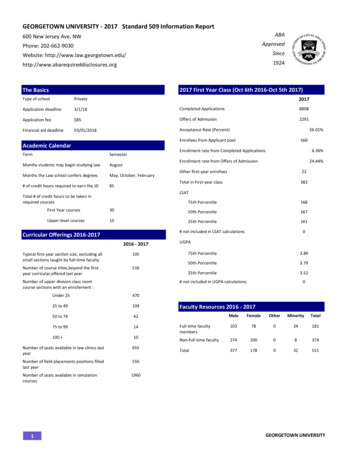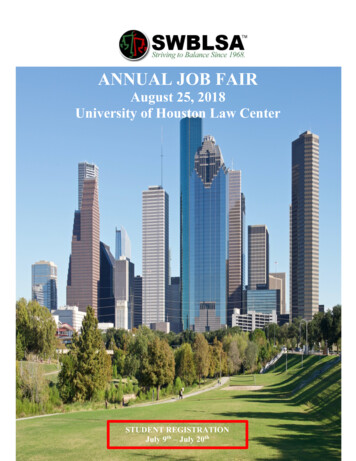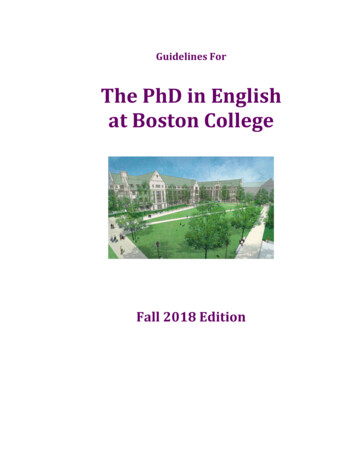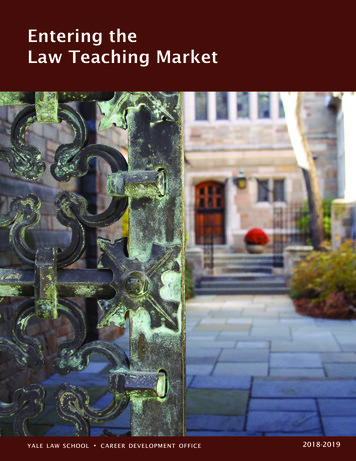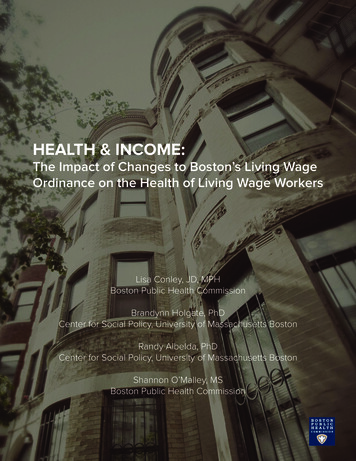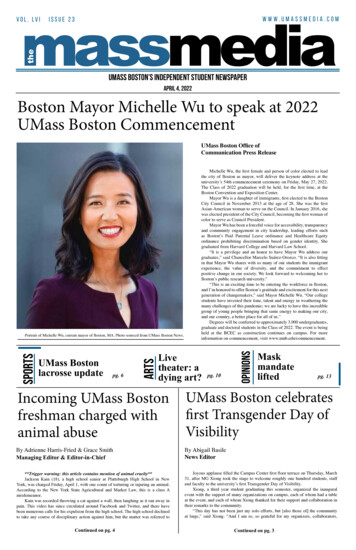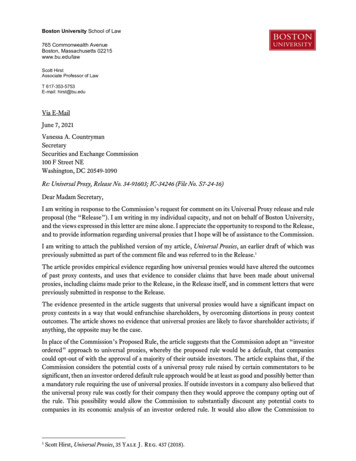
Transcription
Boston University School of Law765 Commonwealth AvenueBoston, Massachusetts 02215www.bu.edu/lawScott HirstAssociate Professor of LawT 617-353-5753E-mail: hirst@bu.eduVia E-MailJune 7, 2021Vanessa A. CountrymanSecretarySecurities and Exchange Commission100 F Street NEWashington, DC 20549-1090Re: Universal Proxy, Release No. 34-91603; IC-34246 (File No. S7-24-16)Dear Madam Secretary,I am writing in response to the Commission’s request for comment on its Universal Proxy release and ruleproposal (the “Release”). I am writing in my individual capacity, and not on behalf of Boston University,and the views expressed in this letter are mine alone. I appreciate the opportunity to respond to the Release,and to provide information regarding universal proxies that I hope will be of assistance to the Commission.I am writing to attach the published version of my article, Universal Proxies, an earlier draft of which waspreviously submitted as part of the comment file and was referred to in the Release.1The article provides empirical evidence regarding how universal proxies would have altered the outcomesof past proxy contests, and uses that evidence to consider claims that have been made about universalproxies, including claims made prior to the Release, in the Release itself, and in comment letters that werepreviously submitted in response to the Release.The evidence presented in the article suggests that universal proxies would have a significant impact onproxy contests in a way that would enfranchise shareholders, by overcoming distortions in proxy contestoutcomes. The article shows no evidence that universal proxies are likely to favor shareholder activists; ifanything, the opposite may be the case.In place of the Commission’s Proposed Rule, the article suggests that the Commission adopt an “investorordered” approach to universal proxies, whereby the proposed rule would be a default, that companiescould opt-out of with the approval of a majority of their outside investors. The article explains that, if theCommission considers the potential costs of a universal proxy rule raised by certain commentators to besignificant, then an investor ordered default rule approach would be at least as good and possibly better thana mandatory rule requiring the use of universal proxies. If outside investors in a company also believed thatthe universal proxy rule was costly for their company then they would approve the company opting out ofthe rule. This possibility would allow the Commission to substantially discount any potential costs tocompanies in its economic analysis of an investor ordered rule. It would also allow the Commission to1Scott Hirst, Universal Proxies, 35 Yale J. Reg. 437 (2018).
conduct more effective retrospective analysis of the rule, by observing how many companies do indeed optout of the rule.Should you have any questions about the article or the conclusions drawn above, please do not hesitate tocontact me.Sincerely,Scott Hirst
UNIVERSAL PROXIESScott HirsttContested director elections are a central feature of the corporatelandscape and underlie shareholderactivism. Rules governingproxy voting byshareholders prevent shareholders from "mixing and matching" amongnomineesfrom the two sides ofcontests. This Article's analysis shows that theseproxy voting rules can lead to distorted proxy contest outcomes: differentdirectors being elected than if shareholders had been able to vote how theywished. These distortions are likely to have significant consequences for theaffected companies and ex ante consequencesfor many more companies.Changes to corporatevoting rules are currently the subject ofan importantpolicy debate. The Securities and Exchange Commission (SEC) has proposed auniversalproxy regulation, which would allow shareholders to vote for theirpreferred mix of nominees, and would eliminate distortions in proxy contestoutcomes. But the rule has been met with substantial opposition. This Articleprovides the first empirical analysis of the extent of distortions, and the likelyeffects ofuniversalproxies.The Article's empirical analysis uses a comprehensive and largely handcollected data set. It demonstrates that distortedproxy contest outcomes are areal andpracticalproblem. As many as 15% ofproxy contests between 2001 and2016 may have had distorted outcomes. Contrary to the claims of mostcommentators, there is no empiricalevidence that universalproxies wouldfavorspecial interests or lead to morefrequent proxy contests.The Article analyzes how the SEC should implement universalproxies andexplains that a rule permittingcorporationsto opt out ofuniversalproxies wouldbe superior to the SEC's proposed regulation, which would require allt Research Director, Harvard Law School Program on Institutional Investors; Lectureron Law, Harvard Law School. For many helpful comments and discussions, I am grateful to MaryEllenAndersen, Michal Barzuza, Scott Bauguess, Lucian Bebchuk, Bill Bratton, Tara Bhandari, Jay Brown,Emiliano Catan, Chris Cemich, Ning Chiu, Art Crozier, Larry Dennedy, Ofer Eldar, Elisabeth deFontenay, Jill Fisch, Jesse Fried, Rich Grossman, Colleen Honigsberg, Robert Jackson, Marcel Kahan,Kobi Kastiel, Joshua Mitts, Yaron Nili, Gabriel Rauterberg, Sarath Sanga, Holger Spamann, Max Steams,Fred Vars, Andrew Verstein, David Walker, Kathy Zeiler, and participants in workshops at AmericanUniversity Washington College of Law, Boston University School of Law, Brooklyn Law School, theFaculty of Law of the University of Hong Kong, Harvard Law School, the University of Alabama Schoolof Law, the University of Colorado Law School, the University of Maryland Francis King Carey Schoolof Law, the University of Miami School of Law, the University of Pennsylvania Law School, USC GouldSchool of Law, the Wharton School at the University of Pennsylvania, the 2017 National Business LawScholars Conference, the 2017 Junior Corporate Law Workshop, and the 2018 American Law andEconomics Association Annual Meeting. I am grateful to the Harvard Law School Program on CorporateGovernance for financial support and to Jordan Figueroa for research assistance.437
Yale Journal on RegulationVol. 35, 2018corporations to use universalproxies. If the SEC chooses not to implement auniversalproxy regulation, the Article explains how investors could implementuniversalproxies throughprivate orderingto adopt "nominee consentpolicies.". 439.Introduction446.I. The Problem with Corporate Voting Rules.447.A. The Importance of CorporateElections .1. The Importance of Director Elections in Corporations . 447. 4482. Contested Election and Hedge Fund Activism .3. The Effects of Corporate Voting Rules and Contested Elections450.453.B. Corporate Voting Rules.453.1. Proxy Voting455.Problem2. The Mix-and-Match458.3. The Universal Proxy Solution .C. A BriefHistory of UniversalProxies in the UnitedStates.458D. The Debate About UniversalProxies.462. 466.II. Distortions in Proxy Contests. 467.A. DistortionsBetween SidesB. Distortions Within Sides.471.474III. The Incidence of Distorted Proxy Contests. 474Contests.A. Data on Recent ProxyContestsProxyinDistortionsB. Methodology for Identifying Expected477C. The Likely Incidence ofDistortionsin Recent Proxy Contests.480D. The Maximum Bounds ofDistortionsin Recent Proxy Contests . . 483E. Assumptions UnderlyingEmpiricalAnalysis and Robustness Tests488.1. Assumption of Independent For Votes.4882. Assumptions Regarding Continuing Withholds.490. 4933. Assumptions Regarding Maximum Withholds .494.IV. The Implications for Proxy Contests. 494A. The Likely Consequences of UniversalProxies.1. The Significance of Distortions, and Universal Proxies.494. . . .4952. Which Side Would Universal Proxies Favor? . . . . . . . 4953. The Frequency of Proxy Contests . 4964. The Frequency of Mixed Board Outcomes versal5.6. Effects of Universal Proxies on Choices of Nominees.498. 4987. Universal Proxies and Voting Behavior .8. Explaining Management Opposition to Universal Proxies.499. 500B. The Implicationsfor the UniversalProxy Debate. 502.V. Fixing Distortions in Proxy Contests438
Universal ProxiesA. UniversalProxy Regulation. 502B. Nominee Consent Policies. . 506Conclusion.509Appendix: Model Nominee Consent Resolutions.511A. PrecatoryNominee ConsentPolicy Resolution. 511B. Nominee ConsentPolicy Bylaw Amendment Resolution.511IntroductionDirector elections are central to the functioning of corporations and theirfutures. They are even more important in light of the rise of hedge fund activism.However, federal and state rules governing director elections limit howshareholders can vote in election contests. This Article shows how this limitationcreates the possibility of distortions in election outcomes: different directorsbeing elected than a plurality of shareholders would have preferred. TheSecurities and Exchange Commission (SEC) has proposed a "universal proxy"regulation that would allow shareholders to vote as they wish and eliminate thepossibility of distortions. But the regulation has been met with substantialopposition. This Article provides the first empirical evidence of the extent ofdistortions in proxy contest outcomes and the likely effects of universal proxies.Based on this evidence, the Article concludes that the SEC should adopt an optout version of its proposed universal proxy rule. If the SEC does not adoptuniversal proxies (including for political reasons), the Article proposes thatcorporations should adopt their own universal proxy arrangements by "nomineeconsent" policies as a second-best alternative.Director elections are central to the operations of corporations. Thisprinciple is enshrined both in state law and federal securities law.2 The directorschosen in elections determine the future course of the corporation. If the electionprocess reelects directors that have made poor decisions, or fails to elect directorsthat are likely to make good decisions, then it can have a harmful effect ondirectors' incentives in managing corporations.Director elections also lie at the crux of the contentious debate about thevalue of shareholder activism. Most director elections involve the nominees putforward by the corporation ("management nominees"), who are often electedunopposed. However, a small number of director elections are contested 3 andinvolve dissidents who put forward competing nominees for election because1.See, e.g., Blasius Indus. Inc. v. Atlas Corp., 564 A.2d 651, 659 (Del. Ch. 1988) ("Theshareholder franchise is the ideological underpinning upon which the legitimacy of directorial powerrests.").2.The entire system of federal regulation of corporate disclosure is built upon Section14 of the Securities Exchange Act of 1934, which governs the solicitation of proxies for corporateelections. See Securities Exchange Act of 1934, 15 U.S.C. § 78n (2018).3.Contested elections represent about 0.5% of director elections each year. See infraTable 4 and accompanying text.439
Yale Journal on RegulationVol. 35, 2018they disagree with the direction taken by corporate management. Contestedelections take on an outsized significance, since only at these elections doinvestors have a choice among potential directors. These contests oftendetermine the future direction of the corporation and involve great attention andactivity. Incumbent directors and managers fight to maintain their positions andcontinue the corporation's current direction; dissidents fight to replace directorsand influence that direction. Shareholders are equally concerned with contestedelections, as the value of their investment in the corporation is at stake. Themajority of dissidents initiating proxy contests are hedge fund activists, whoacquire stakes in corporations they consider to be undervalued and seek toinfluence those corporations to increase value. The impact of this kind ofshareholder activism on long-term value is currently the subject of considerabledebate.4 In more than 90% of activist engagements, management and dissidentsreach a settlement.5 The effects of contested elections have an impact wellbeyond the boundaries of the particular contest: their outcomes set theexpectations of parties contemplating potential activist engagements orsettlements of existing engagements regarding the likely outcome if theengagement is not settled. The importance of these elections for the corporatelandscape, and the heightened conflict they present, means that the rules for howcontested elections are conducted are of central importance.The combination of state and federal law that governs director electionslimits shareholders' ability to choose the nominees they may prefer in contestedelections. Director elections are governed by state corporate law, which providesthat director elections take place at shareholder meetings.6 Rather than attendingthe shareholder meeting, shareholders vote almost entirely by proxy. In thiscontext, the word "proxy" refers to the power vested by the shareholder inpersons (the "proxy holders") to vote on behalf of the shareholder; the vestingtakes place by the shareholder executing a form of proxy or "proxy card."7 Theproxy card instructs proxy holders to vote for a director or withholds authorityfrom the proxy holder to vote for certain directors, which are commonly referredto as "withhold votes." Proxy holders are required to attend the meeting and voteas instructed.In contested elections, each side solicits shareholders to execute their side'sproxy card, thereby appointing their representatives as the shareholders' proxyholders. The Securities Exchange Act of 19348 empowered the SEC to regulateSee infra note 35 and accompanying text.4.See infra Table I and accompanying text.5.6.See, e.g., DEL. CODE ANN. tit. 8, § 211(b) (2017) ("Unless directors are elected bywritten consent in lieu of an annual meeting, an annual meeting of stockholders shall be held for theelection of directors . . . ."). Usually these are annual meetings, but they may also be special meetingscalled for the particular purpose. In a limited number of corporations, shareholders may also be able toact by written consent, including electing directors to fill vacancies on the board.So-called because the form of proxy that is generally solicited from shareholders is7.usually printed on card stock. See 17 C.F.R. § 240.14a-4(a)(2) (2017) (referring to "the proxy card").Securities Exchange Act of 1934, 15 U.S.C. § 78a-78qq (2018).8.440
Universal Proxiesthe solicitation of proxies.9 Part of the SEC's proxy regulations, known as the"bona fide nominee rule," prevents parties from soliciting proxies for nomineeswithout the nominees' consent.1 0As a practical matter, this limits each side to using proxy cards whichinclude only their own nominees. State law considers proxy cards executed byshareholders to revoke any proxy cards that they have previously executed," soshareholders cannot vote on multiple proxy cards solicited by different sides. Ina contested election, these rules prevent shareholders voting on these cards from"mixing and matching" among nominees from different sides' proxy cards, 12which the shareholders could do if they were to attend the meeting in person."Marcel Kahan has analogized this situation to a political election, with "aDemocratic voting station where you can only vote for Democrats and aRepublican voting station where you can only vote for Republicans and thereisn't any option to split your vote,"' 4 for instance, by voting for a Democraticpresidential candidate and a Republican senatorial candidate. In such a system,if a voter at a Democratic voting station wanted to support a Republicansenatorial candidate, they could not votefor that nominee; the best they could dowould be to not vote for the Democratic opponent.9.Id. § 78n(a)(1) ("It shall be unlawful for any person . .in contravention of such rulesand regulations as the Commission may prescribe as necessary or appropriate in the public interest or forthe protection of investors, to solicit or to permit the use of his name to solicit any proxy or consent orauthorization in respect of any security . . . .").10.See 17 C.F.R. § 240.14a-4 (2017) ("No proxy shall confer authority: (1) To vote forthe election of any person to any office for which a bona fide nominee is not named in the proxy statement. . . ."). The bona fide nominee rule had previously been incorporated into the precursor to Rule 14a-4 in1940. See Exchange Act Release No. 34-2376, 5 Fed. Reg. 174 (Jan. 12, 1940). The intention of the ruleappears to have been to curb a practice whereby parties sought proxies to vote for nominees that, if elected,were expected to immediately resign and be replaced by other nominees that had not been named. SeeRonald J. Gilson et al., How the Proxy Rules DiscourageConstructiveEngagement:Regulatory Barriersto Electing a Minority ofDirectors, 17 J. CORP. L. 29, 40 (1991). ("Our best conjecture concerning therule's goal is to prevent dissidents (or management) from running dummy director candidates.Conceivably, opportunistic managers or challengers might seek to mislead voters by placing directorcandidates on their proxy who had not assented or did not intend to serve."). In 1967, language was addedto Rule 14a-4 to codify the administrative interpretation of "bona fide nominee[s]" as ones that had"consented to be named and to serve if elected." See Exchange Act Release No. 34-8206, 32 Fed. Reg.20,960 (Dec. 14, 1967)11.See, e.g., Standard Power & Light Corp. v. Inv. Assocs., 51 A.2d 572, 580 (Del. Ch.1947), aff'd, 51 A.2d 572 (Del. 1947) ("[W]hen two proxies are offered bearing the same name, then theproxy that appears from the evidence to have been last executed will be accepted and counted under thetheory that the latter - that is, more recent-proxy constitutes a revocation of the former."); see alsoConcord Fin. v. Tri-State Motor Transit Co. of Del., 567 A.2d 1, 8 (Del. Ch. 1989) (reaffirming InvestmentAssociates).12.As explained further in Part I, in the case of a "short slate" shareholders may be ableto vote for certain management nominees on the dissident card, but only those selected by the dissidents,not any other mix that the shareholder may prefer.13.As explained further in Part I, shareholders wishing to vote for their own mix ofmanagement and shareholder nominees can execute a "legal proxy" to vote in their specified way at themeeting. However, this involves certain difficulties and is rarely used by shareholders.14.Ronald D. Orol, Universal Proxy Battle Fight Gathers Steam at SEC, THESTREET(Sept. 20, 2013, 3:49 PM), html [http://perma.cc/Y495-7ELH].441
Yale Journal on RegulationVol. 35, 2018The solution to this problem is obvious. Parties could be permitted orrequired to solicit "universal proxies." Universal proxies are simply proxy cardsthat include nominees from each side. The idea of a universal proxy should seemuncontroversial. No other common law jurisdictions use the split proxy systemthat governs corporate voting in the United States, and there are no closeanalogues in political elections. Investor groups have urged the SEC to adopt auniversal proxy rule so that they would be able to mix and match their preferrednominees." In response, the SEC has proposed a universal proxy regulation ("theRelease") aimed at allowing shareholders to vote by proxy in the same way thatstate law would permit them to vote if they attended the shareholder meeting.16However, the idea of a universal proxy has been met with substantial opposition,led by the U.S. Chamber of Commerce. Opponents of a universal proxy rule haveraised concerns that it is likely to increase the ease and frequency of proxy fightsand empower special interests. This opposition has resulted in the U.S. Houseof Representatives passing two bills that, if enacted, would have the effect of8preventing the SEC from implementing a universal proxy rule.'This Article informs that debate. It provides a framework to understand theconsequences of the mix-and-match problem and shows how it can result indistorted election outcomes. Prior to this Article, there had been scant evidenceabout the extent of such distortions or the likely effects of a universal proxy ruleSee, e.g., Letter from Glenn Davis, Dir. of Research, Council of Institutional Inv'rs,15.to Elizabeth Murphy, Sec'y, U.S. Sec. & Exch. Comm'n 1 (Jan. 8, 2014), pdf [http://perma.cc/DD6V-D6UP] (requesting that the SEC "facilitate the useof universal proxy cards featuring a complete list of board candidates in cases of a contested election ofdirectors").Exchange Act Release No. 34-79164, 81 Fed. Reg. 79,122, 79,124 (Nov. 10, 2016)16.("[R]eplicating the vote that could be achieved at a shareholder meeting is the most appropriate means toensure that shareholders using the proxy process are able to fully and consistently exercise the 'faircorporate suffrage' available to them under state corporate law and that Congress intended our proxy rulesto effectuate." (footnote omitted)).Letter from R. Bruce Josten, Exec. Vice President, U.S. Chamber of Commerce, to17.Members of the U.S. House of Representatives (June 22, 2016), ents/files/160622 kv hr5485 20 17 house.pdf [http://perma.cc/SU39-MVWL] (urging members to "[s]upport an amendment [to the Act]expected to be offered that would place a funding limitation prohibiting the Securities and ExchangeCommission (SEC) from developing, implementing, finalizing or enforcing universal proxy ballotproposals or SEC rulemaking to allow or explore universal proxy ballots"); Letter from Tom Quaadman,Vice President, Ctr. for Capital Mkts. Competitiveness, to Mary Jo White, Chair, U.S. Sec. & Exch.Comm'n 3-4 (Feb. 18, 2015), ("Mandating a universal ballot. . . would inevitably increase the frequency and ease of proxy fights .[T]he universal ballot may empower a small vocal minority at the expense of the majority.").See Financial CHOICE Act of 2017, H.R. 10, 115th Cong. § 845 (2017) ("The18.Commission may not require that a solicitation of a proxy, consent, or authorization to vote a security ofan issuer in an election of members of the board of directors of the issuer be made using a single ballot orcard that lists both individuals nominated by (or on behalf of) the issuer and individuals nominated by (oron behalf of) other proponents and permits the person granting the proxy, consent, or authorization toselect from among individuals in both groups."); see also H.R. 5485, 114th Cong. § 1215 (2016)(containing identical language and proposing to prevent the SEC from using appropriated funds to"propose, issue, implement, administer, or enforce any requirement" of the kind described in § 845 of theFinancial CHOICE Act bill).442
Universal Proxieson contest outcomes. As a result, there has been no basis to evaluate the claimsmade by opponents of the rule about the potential cost of universal proxies. Theempirical analysis in this Article allows an evaluation of the extent of distortionsin proxy contest outcomes, and the likely effects of universal proxies.One potential consequence of the mix-and-match problem in the currentproxy voting rules is distortions in the outcomes of proxy contests. That is,different directors may be elected than if all shareholders had been able to voteas they wished, for instance, by attending the shareholder meeting or using auniversal proxy. Distorted proxy contest outcomes can take two forms. First,there may be a distorted choice between the sides in the proxy contest. That is,the split between the number of management nominees elected and the numberof dissident nominees elected may be different from the split which investorswould have made had they been able to mix and match. Such a distorted choicebetween sides took place at the 2009 annual meeting of Biogen Idec Inc. Fournominees were elected: two management nominees and two dissident nominees.Had the average withhold votes on each side been voted in favor of nominees onthe other side, management nominee Alan Glassberg would have been elected inplace of dissident nominee Richard Mulligan. Mulligan's election likelyrepresented a distorted choice between sides.Second, there may be a distorted choice within sides. That is, the particularnominees that are elected from one side may be different from the nominees thatinvestors would have chosen had they been able to mix and match. A distortionof this kind may have taken place at the 2015 annual meeting of RoviCorporation. Seven board seats were up for election. Two dissident nomineeswere elected, along with five management nominees, including James Meyer.Had shareholders withholding votes been able to vote for opposing nomineesand had the number of shareholders that preferred to vote for managementcandidate James O'Shaughnessy over Meyer exceeded the number that preferredMeyer over O'Shaugnessy by 18% of the votes cast on that card, O'Shaughnessywould have been elected in Meyer's place.The Article's empirical analysis shows that distorted proxy contestsrepresent a real and practical problem. As many as 15% of proxy contestsbetween 2001 and 2016 may have had distorted outcomes. Based on the mostconservative assumptions about how shareholders could have voted under sucha system, at least 7% of contests are likely to have been distorted, including 10%of contests at large corporations.The analysis shows no evidence to support the claim made by opponents ofthe regulation that universal proxies would favor shareholder activists. Ifanything, the actual effect is likely to favor managers. Of the contests where adistortion can be expected to have favored one side or the other, universal proxiescan be expected to have resulted in management nominees being elected in placeof dissident nominees in two-thirds of cases, compared to one-third of caseswhere dissident nominees would be elected in place of management nominees.443
Yale Journal on RegulationVol. 35, 2018This analysis permits inferences about the further effects of universalproxies that assuage many concerns raised in the debate. Concerns have focusedon the possibility that universal proxies would increase the ease of proxy contestsfor dissidents or dissidents' success rates in proxy contests. Since the evidenceprovides no basis to conclude that universal proxies would favor dissidentnominees, there is also no evidence that dissidents are likely to initiate proxycontests more often under a universal proxy system. If anything, a universalproxy system may lead to slightly fewer proxy contests. Universal proxies couldonly have resulted in different outcomes where at least 30% of votes were infavor of at least one dissident. Contrary to concerns raised by commentators,universal proxies are therefore unlikely to result in greater success for dissidentswith parochial views that are not shared by a significant proportion ofshareholders.These results present a puzzle. If universal proxies would be likely to favormanagers and not dissidents, why are they opposed so strongly by groups thatgenerally represent the interests of managers? It could be that these groupsmisunderstand the likely effect of the regulation. If this is the case, the evidencepresented in this Article could cause them to relax their opposition. If they donot do so, one explanation may be that these groups are attacking universalproxies for their strategic value in a larger fight over increases in shareholderpower. 19 The value to such groups in opposing increases in shareholder powermay outweigh the benefits that universal proxies would give their constituents inresisting dissidents.The normative value of universal proxies in eliminating distorted proxycontest outcomes is clear. However, it is much harder to determine the normativeeffects of which sides win proxy contests for two reasons. First, the effects ofuniversal proxies on proxy contest outcomes presented in the Article describe apartial equilibrium: it is based on an analysis of voting data, holding constantmany other factors, like the voting choices of investors, and the nominationchoices of management and dissidents. Were universal proxies to beimplemented, many of these other factors may change, with uncertain outcomes.Second, even if the full equilibrium effects of universal proxies on proxy contestoutcomes and future proxy contests were known, the nature of the relationshipbetween universal proxies and shareholder value is not clear. Rather, it is thesubject of considerable debate. For these reasons, it is impossible to undertake acomprehensive determination of the value or welfare effects of universal proxies.Instead, the SEC should consider the validity of the arguments made forand against universal proxies. The argument
School of Law, the Wharton School at the University of Pennsylvania, the 2017 National Business Law Scholars Conference, the 2017 Junior Corporate Law Workshop, and the 2018 American Law and Economics Association Annual Meeting. I am grateful to the Harvard Law School Program on Corporate

